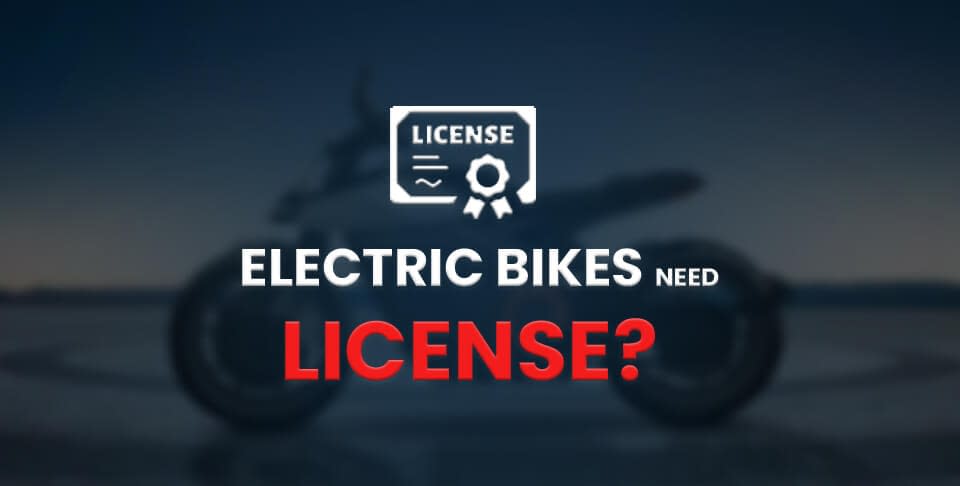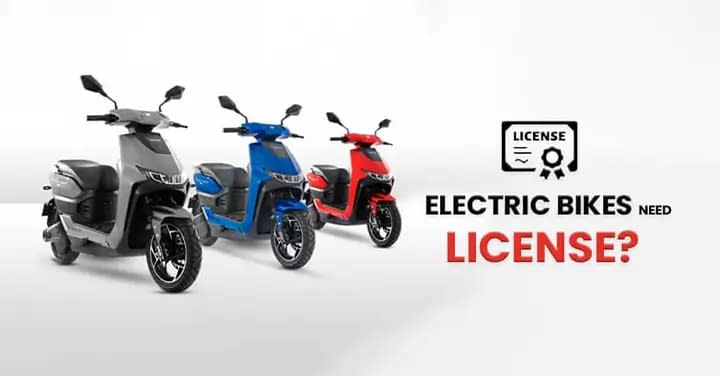E-bikes have zoomed into our lives, offering a fun, eco-friendly, and practical way to get around. Whether you’re commuting through city streets, exploring scenic trails, or simply enjoying a leisurely ride, e-bikes have revolutionized personal transportation. However, as with any vehicle, there are rules of the road to follow, and those rules can be a bit confusing when it comes to e-bikes.
One of the most common questions that pops up is whether or not you need a license to ride an e-bike. And the truth is, it’s not a simple yes-or-no answer. The regulations governing e-bike licensing are like a patchwork quilt, with different rules stitched together depending on where you are and what kind of e-bike you have.
License or No License? That is the Question.

Let’s clear up a common misconception: not all e-bikes require a license. In many places, e-bikes are treated much like their non-motorized counterparts. If your e-bike doesn’t go too fast and doesn’t have a super-powerful motor, you’re probably in the clear. These are usually classified as Class 1 or Class 2 e-bikes, which typically have a maximum assisted speed of 20 mph (32 km/h). They rely on you pedaling, with the motor just giving you a little extra oomph.
But, things get a bit more complicated when we talk about Class 3 e-bikes. These are the speed demons of the e-bike world, capable of reaching up to 28 mph (45 km/h), often with a throttle that lets you cruise without pedaling. Because of their higher speed and power, Class 3 e-bikes are more likely to be subject to licensing requirements, especially for younger riders.
The E-Bike Classification Puzzle
To figure out if you need a license, it’s important to understand how e-bikes are classified. While many states have adopted a standard three-class system, some states march to the beat of their own drum with unique classifications and rules. Here’s a quick rundown of the common classes:
- Class 1: These are the most basic e-bikes. You have to pedal to get the motor going, and it stops helping you once you hit 20 mph.
- Class 2: These have a throttle, so you can zoom up to 20 mph without pedaling.
- Class 3: These are like Class 1 e-bikes, but the motor can assist you up to 28 mph.
Generally, Class 1 and 2 e-bikes are less likely to require a license, while Class 3 e-bikes might need one depending on your location and age.
State-by-State E-Bike Law Safari
The United States is a vast and diverse country, and that diversity extends to e-bike laws. It’s like a patchwork of regulations, with each state having its own unique set of rules. Some states, like New York, treat e-bikes as regular bicycles, so no license is needed. Others, like California, have stricter rules, especially for Class 3 e-bikes.
To navigate this maze of regulations, you’ll need to do some research. Check your state’s Department of Motor Vehicles (DMV) website, talk to folks at your local bike shop, or reach out to e-bike advocacy groups. They can give you the most accurate and up-to-date information on what’s legal in your neck of the woods.
Age Matters: Who Can Ride an E-Bike?
Along with licensing, there are also age restrictions to consider. These can vary depending on the state and the class of e-bike. In most cases, teenagers and adults can hop on an e-bike without any issues. However, some states might have minimum age requirements for Class 3 e-bikes, usually because of their higher speeds.
So, before you let your teenager take your e-bike for a spin, make sure you know the age restrictions in your area.
Getting Licensed: If You Need To
If your state requires a license for your type of e-bike, don’t worry, it’s not as complicated as getting a driver’s license. You’ll likely need to pass a written test on traffic laws and safe riding practices, and you might have to take a road test too. The process will vary depending on your state, so be sure to check with your local DMV or similar agency for the details.
Safety First: Always Ride Responsibly
While licensing is important, safety should always be your top priority. Whether or not you need a license, always wear a helmet, follow traffic laws, use lights and reflectors when it’s dark, and be courteous to pedestrians and other road users.
E-Bikes and Insurance: Do You Need It?
While most states don’t mandate e-bike insurance, it’s definitely something to consider. E-bike insurance can be a lifesaver if your bike gets stolen or damaged in an accident. It can also protect you financially if you happen to cause an accident and injure someone else. So, while it’s not required by law in most cases, having e-bike insurance can offer valuable peace of mind.
Sidewalk Surfing: Can You Ride Your E-Bike There?

This is where things can get a little tricky. Whether or not you can ride your e-bike on the sidewalk depends entirely on where you are. Some cities welcome e-bikes on sidewalks, while others ban them outright. In some places, it might even depend on the class of your e-bike. So, before you take a shortcut through the sidewalk, be sure to check your local ordinances to avoid any fines or run-ins with pedestrians.
Caught Riding Without a License? What Happens?
If you’re caught riding an e-bike that requires a license but you don’t have one, the consequences can vary. You might be slapped with a fine, or worse, your beloved e-bike could get impounded. So, it’s always better to play it safe and make sure you’re following the rules.
Are There Federal Laws for E-bikes?
While the federal government doesn’t have a specific set of laws for e-bikes, they do fall under the jurisdiction of the Consumer Product Safety Commission (CPSC). The CPSC has established some safety standards that e-bikes must meet to be considered “consumer products.”
Where Can You Find More Information?
If you’re still hungry for more information on e-bike laws in your state, there are plenty of resources available. Your state’s DMV website is a great place to start. You can also chat with knowledgeable folks at your local bike shop or connect with e-bike advocacy groups. They’ll be happy to answer any questions you have and help you stay on the right side of the law.
The Future of E-Bikes: Riding into a Bright Tomorrow
E-bikes are more than just a passing trend; they’re a transportation revolution. As more and more people discover the joys of e-bike riding, we can expect to see continued innovation, improved infrastructure, and perhaps even clearer and more uniform regulations across the country.
So, whether you’re a seasoned e-bike enthusiast or just considering taking the plunge, remember to stay informed, ride responsibly, and most importantly, have fun! E-bikes offer a unique blend of freedom, convenience, and sustainability that can transform the way you travel and experience the world around you. So, hop on, explore, and enjoy the ride!
